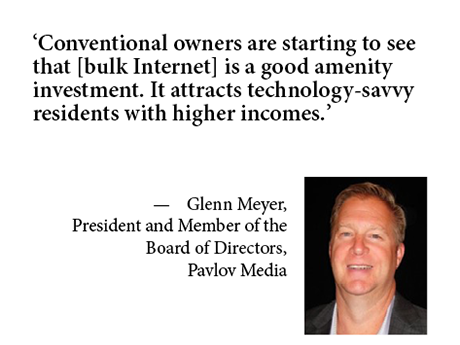Multifamily properties have witnessed a rapid expansion in Internet needs, a trend presaged by burgeoning Internet demands in student housing. Multifamily residents have increased their connection demands and are becoming increasingly sophisticated in their requirements for high-quality Internet. What can the lessons of student housing connectivity teach us about traditional multifamily trends, especially when it comes to bulk Internet?
Bulk Internet approaches allow for more sophistication in multifamily properties, as demonstrated by student housing best practices. Student housing pioneered built-in networks to keep mobile devices from competing for Wi-Fi bandwidth, minimize downtime and use fiber connections to ensure speed and reliability. This style of network is becoming the gold standard for constant, heavy-duty Internet use in multi-dwelling units (MDUs).
High-level connectivity is becoming an absolute necessity for multifamily properties, drawing in residents and improving their Internet-driven lifestyles. And as never-before-seen demand for bandwidth is graduating from dorm rooms to traditional apartments, well-planned multifamily Internet connections can help operators adapt gracefully.
COVID’s Role in Internet Use Expansion
COVID lockdowns accelerated already growing Internet requirements, which pushed Internet quality to the forefront as connectivity became increasingly important. “COVID put the spotlight on properties to make sure they had great infrastructure. The demand skyrocketed for high-quality broadband networks,” says Glenn Meyer, president and member of the board of directors at Pavlov Media, a Champaign, Ill.-based Internet service provider.
However, tenant expectations for high speeds and seamless connection were already rising well before the advent of COVID and are likely to expand exponentially into the future, especially as work-from-home, gaming and streaming culture become more firmly rooted in the preferences of multifamily residents. COVID merely fast-tracked an existing trend in Internet use.
Expanding Internet Requirements
Internet use for working from home, studying, gaming, streaming entertainment, home security and more has mushroomed, and so has the need to eliminate network downtime. Demand trends for Internet use first seen in student housing have spread outward through traditional multifamily properties. Tech-savvy Internet users expect the same kind of uninterrupted Internet access and high speeds that bulk Internet coverage is delivering in dorm rooms.
“Student housing is the most demanding and hardest market to serve. Students are often early adopters of technology, and they have little patience for substandard Internet service. They expect 100 percent uptime, and they have a ferocious appetite for bandwidth. When it comes to student housing, owners must invest in the very best network infrastructure their budget allows for,” explains Meyer.
“Quality Internet means minimizing downtime for our users. In addition to MDU services, we design, build and operate across markets, including student housing. Pavlov has built a number of its own municipal fiber networks, so we’re able to avoid the kinds of slowdowns that plague many MDU properties. We can enhance security and minimize latency by connecting all the components of the network to our private national backbone. This allows for a much higher quality user experience for our customers,” says Meyer.
Growing Demand Across All Multifamily Properties
The shift upward in bandwidth demand is not limited to traditional multifamily. Meyer points out the rising use of Internet services in seniors housing and hotels as well. Still, student housing always has the most sophisticated user base that is hungry for outrageous bandwidth.
When these technology savvy students graduate, they’re bringing their same Internet user experience expectations to the traditional multifamily market, even as Internet reliance is becoming a way of life for the population at large.
“Conventional owners are starting to see that this is a good amenity investment. It attracts technology-savvy residents with higher incomes; these residents can afford higher rents. At the end of the day, better Internet access also provides better resident retention for property owners,” Meyer elaborates.
A Pew Research Center survey conducted in 2021 revealed that 31 percent of Americans go online “almost constantly.” The demographics captured by the survey indicated the following: respondents who indicated that they are “almost constantly online” are far more likely to be college-educated, in higher-income households and living in cities. As part of this ongoing trend, consumer bandwidth demands have more than doubled in the span from 2017 to 2021.
Internet use, specifically among those using the Internet to work from home, stream content and game has become a way of life. Bandwidth-hungry residents are taking the high expectations for Internet connections from their on- and off-campus housing and bringing them into a multifamily world that’s increasingly dependent on fast connections.
High Demand for Content
The realities of student housing also guide Pavlov’s approach to television and video services. With video services in a state of flux and students consuming more media than ever, some student housing operators are turning to less costly targeted video packages to bring content to their properties. These packages are geared towards tenant profiles and provide another option to residents via their preferred method of content access and consumption.
Meyer explains, “The byproduct of not having video services is that operators end up needing even more bandwidth, more wireless access points and more involved network infrastructure, because that content demand will just go to streaming instead. The demand doesn’t go away; it just comes through a different delivery medium other than TV.”
Consumer hunger for content cannot be abated: it can only be channeled.
Pavlov Media is a content partner of REBusinessOnline. For more information on Pavlov Media, click here.


